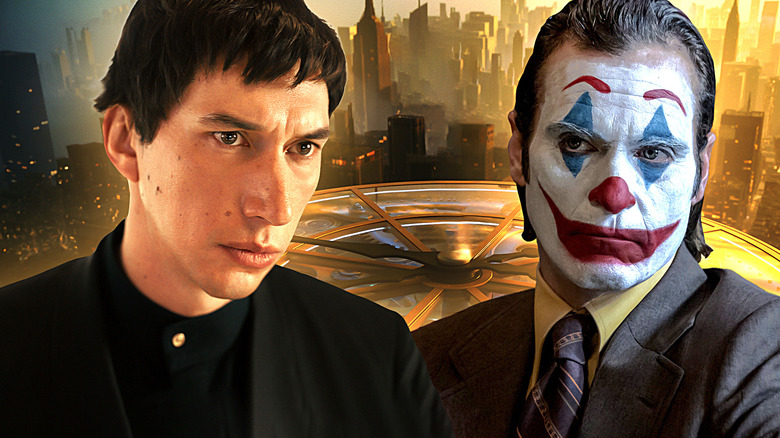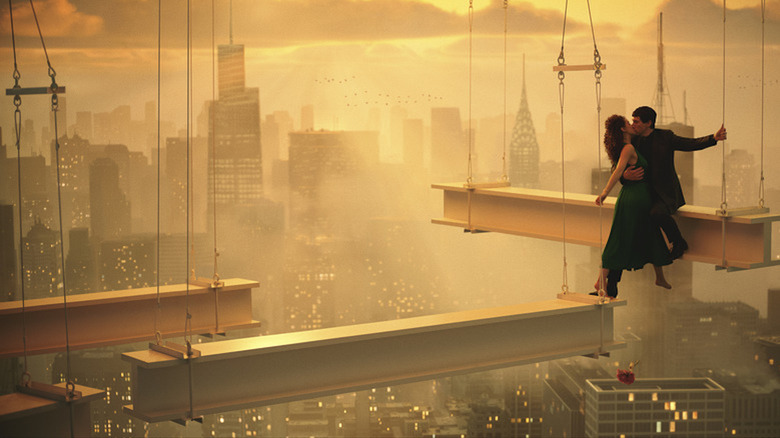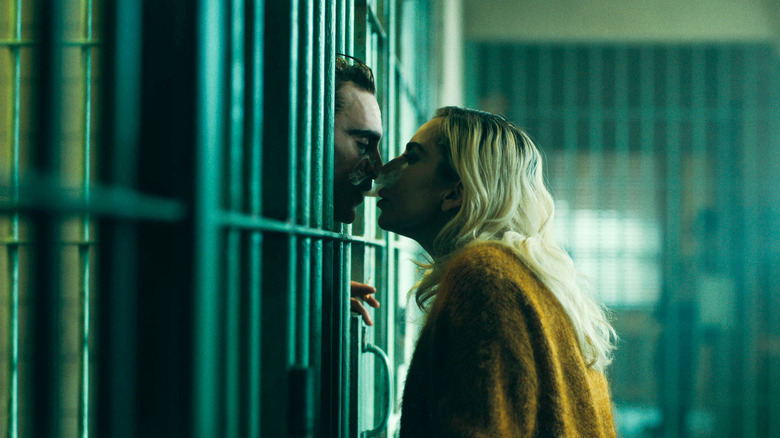The Two Biggest Cinematic Fiascos Of 2024 Diverge In One Fascinating Way
This article contains mild spoilers for "Megalopolis" and "Joker: Folie à Deux."
The film industry has just experienced what seems to me an unprecedented two week span of outrageous misfortune. If we trust the high end of their estimated budgets (and, in this case, judging from what I've heard, I'm inclined to buy these numbers), Francis Ford Coppola's "Megalopolis" and Todd Phillips' "Joker: Folie à Deux" combined to gross a mere $44 million on exorbitant budgets totaling $344 million.
On the surface, "Megalopolis" would appear to be the bigger disaster; now in its second weekend, the $136 million production has amassed only a paltry $6 million. Granted, Coppola sold his Sonoma Country wineries and borrowed against his new ownership stake in the company that absorbed them to personally finance his physically and intellectually ambitious epic. It's not my money, so I don't care to discuss the wisdom of Coppola's investment; what matters to me is that a massive, star-studded film made without the support of a firmly established IP couldn't generate more than cursory interest from viewers hoping against hope that the maestro had whipped up another unruly masterpiece à la "Apocalypse Now." This was a one-of-a-kind labor of love from one of our greatest living filmmakers, and moviegoers couldn't be bothered (and if they did bother, judging from the film's D+ Cinemascore, they regretted it).
"Joker: Folie à Deux" is the opposite of "Megalopolis" in approach and temperament. It's a studio-backed sequel to a $1 billion worldwide smash featuring the most bankable villain in screen history — a character Phillips has evidently come to despise in the years since the original earned him Oscar nominations for Best Picture and Director. The fans of the first film, who've only grown to love if not outright idolize Arthur Fleck (Joaquin Phoenix), clearly, vehemently did not want to walk out of a 138-minute courtroom drama cum musical feeling emotionally invalidated. In another unprecedented turn of events, a film that was tracking to open with a $70 million three-day gross a week ago struggled to hit $40 million. Toxic word of mouth and a D Cinemascore caused a stunning downtick in audience interest. I know people who returned their tickets upon hearing Phillips' sequel was, at best, an exercise in the inducement of boredom. A 70%-plus second weekend drop is an utter certainty, though, given the fanbase's vitriolic reaction to the movie, I wonder if an 80-percent plummet is possible (which would place "Joker: Folie à Deux" in the all-time bomb company of the Ben Affleck-Jennifer Lopez debacle "Gigli").
While these movies will forever be linked via their unfortunate proximity, they're different kinds of cautionary tales; one is a labor of love, while the other is a labor of hate. What can we learn from them? Will careers be damaged by them? Is it possible the passage of time will be kind to them?
A bizarrely youthful indulgence from an old master who should know better
I hate like hell to write this, but my first viewing of "Megalopolis," a noon screening on the Saturday of its opening weekend in a theater occupied by two other people (one of whom kept snoring himself awake throughout the movie), ranks as one of the most dispiriting moviegoing experiences of my life. I knew the film had received mixed-to-negative reviews from discerning critics with a sense of film history that stretches farther back than "Star Wars;" that these people were going out of their way to say a critical reappraisal akin to the one accorded to Coppola's 1982's flop "One from the Heart" was highly unlikely gave me pause. But Coppola working on a broad canvas for the first time since "Bram Stoker's Dracula" could not be denied, nor could the fact that he'd been trying to get the movie made for several decades.
A passionate Coppola — i.e. one that isn't taking paycheck gigs like "Jack" and "The Rainmaker" (a good movie!) — to pay off debt is always worth the price of admission, even when he misses.
Coppola's last three movies ("Youth Without Youth," "Tetro," and "Twixt") were quasi-experimental works that, while not wholly satisfying, had moments of brilliance tucked within them. Now in his 80s, I wondered if he'd have the creative energy to mount a sprawling tale inspired by Fritz Lang's "Metropolis" and Ayn Rand's "The Fountainhead." The film may be a crushing failure, but it's not for want of energy. "Megalopolis" is an endearingly rambunctious film. It actually feels like a young person's movie — by which I mean a 20-something, fresh-out-of-college kid who just read and watched those aforementioned works, and has a rough first draft for what could be a fascinating spin on their utopian/dystopian visions, but really needs to take a step back and maybe get some other eyes on their script.
In his prime, Coppola could make sense of chaos after seemingly losing control several times over, as witnessed in "Hearts of Darkness: A Filmmaker's Apocalypse." Two years later, in "One from the Heart," he conjured bustling neon magic to tell an intimate love story. He could lose control because he trusted his instincts and knew not just what he wanted to say, but, most importantly, how he wanted audiences to feel.
Moment to moment while watching "Megalopolis," I had no idea what I was supposed to be thinking or feeling. By plunging us into the New Rome orgies early on in the film, I decided Coppola was up to something experiential, so I gave myself over to the wildness of his experiment in the hopes that it would add up to something coherent and moving by film's end. I never stopped believing in the potential of "Megalopolis," but by the time Coppola hit what I hate to say is the film's campy high (a scandalously silly sex scene between Aubrey Plaza and Shia LaBeouf), it felt like the filmmaker had delivered an assemblage of set pieces that worked stitched together by essential pieces of narrative. The finale, in which Driver gives an inspiring speech with the sweaty urgency of a stand-up comic getting the flashing red light from off-stage, broke me.
And yet, two weeks later, as I keep thinking about Coppola's folly, a weird fondness has set in. He sought to entertain and uplift us, to plead to our better angels as our world edges closer toward dystopia. That's a film worth making. I can't say the same thing about "Joker: Folie à Deux."
Meeting madness with badness
Normally, I'd be all in on a mainstream-friendly director risking his career via a theater-of-cruelty comic book movie, but the contempt that drips from every frame of Todd Phillips' "Joker: Folie à Deux" is direly unearned.
Five years ago, Phillips mashed up two Martin Scorsese classics ("Taxi Driver" and "The King of Comedy") as a means of examining the twisted-with-havoc world of the Joker. As someone burned out on the Caped Crusader, I was surprised that the film worked as a visceral, all-caps fulmination against humankind's distressing embrace of aggrieved prophets, men (they're usually men, and white) who feel out of place in a rapidly changing world, and, because they have suffered (Phoenix's Arthur Fleck is the product of abuse), believe they are owed some kind of satisfaction.
Arthur receives that satisfaction in "Joker," and, in killing those who wronged him, becomes an avatar of twisted justice for the increasingly unfettered masses. Phillips didn't valorize Arthur, but, as happened with David Fincher's portrayal of Tyler Durden in "Fight Club," that didn't stop a chunk of moviegoers from viewing the film as a validation of their toxic worldview.
Phillips has evidently noticed this, too, which, for reasons he'll hopefully explain in the near future, compelled him to turn his obligatory sequel into a vicious kiss-off to the first film's ardent fans. Why he needed to do it in the form of a jukebox musical is frustratingly unclear (in that the songs feel wedged in, and further undone by clumsy staging and editing); if it was just a gamble that fanboys would be put off by showtunes, well, he hit the nerve-shredding jackpot there. It's a shame because Phillips is a talented director in his own right.
Whereas "Megalopolis" is giddily begging for your engagement and approval, "Joker: Folie à Deux" is basically playing to no one. Aside from browbeating Joker fans (all the way until the final scene, where Phillips invokes Heath Ledger's defining, misinterpreted-by-clowns — er, different kind of clowns — portrayal of the character), the film has no reason to exist. Once it settles into being a courtroom drama (with Phoenix affecting a Foghorn Leghorn Southern drawl), it becomes a grueling endurance test. Ultimately, the film's biggest miscalculation is the casting of Lady Gaga, who's so glaringly ill-utilized that her Little Monsters are also on the warpath against Phillips.
This all stinks because I'm completely on Phillips' side when it comes to fan worship of the Joker (and Batman for that matter). This whole petulant me-against-the-world mindset is a mental epidemic threatening to turn our world into a gun-ridden hell on Earth. There had to be a way to tackle this topic in a dramatically invigorating manner. Instead, Phillips has opted to meet hate with hate, which leaves those of us who liked the first movie for not being the film its worst supporters believe it to be throwing our hands up and wondering if we could, y'know, since we weren't the offending party, get that $12 back.


